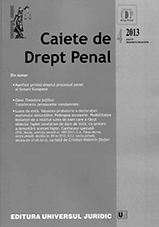Valoarea probatorie a declaraţiei martorului denunţãtor în materia infracţiunii de luare de mitã. Pedeapsa accesorie
The probative value of the Statement given by the Denunciatory Witness in the Case Bribe Taking Offence. The accessory Punishment
Author(s): Cristian-Valentin Ştefan Subject(s): Criminal Law, Civil Law
Published by: Universul Juridic
Keywords: assessment of the evidence; the accessory punishment; special confiscation; the grounds of the aquittal; continued offence.
Summary/Abstract: If the facts contained in the statement of a witness are at odds with the facts contained in the statement of the defendant, the principle is that the truth can be found in the statement of the witness, even if that witness is exactly the sole denouncer. In order to meet the requirements of the special prevention, the accessory punishment of denying the right to practice as a forensic examiner must join the main punishment of the prison, to complete it, so that the roles of coercion and rehabilitation of the criminal sanction as a whole are satisfied. In particular, the need for the accessory punishment results from the nature of the offence committed, the circumstances of the case and the individual of the offender. On the same amount of money, one can’t have both special confiscation and restitution to the person who denounced the act of giving bribes. The incompatibility arises from the differences between those two measures, in terms of the nature, the effect and the enforcement manner. In the situation referred to the article 10 paragraph 1 letter a of the Criminal Procedure Code, there isn’t a deed to produce changes in the outside world. Legaly, between the absence of a deed and the impossibility of proving it, one must have a mark of equivalence. In the situation referred to the article 10 paragraph 1 letter a of the Crimal Procedure Code, there is a deed, which is likely to be framed into a rule of incrimination, but that deed doesn’t meet the content of the crime described by that rule of incrimination. If the prosecutor has indicted for a continued offence and the evidence confirm the existence of only some material acts, the solution is to change the legal classification from the continued offence into a plurality of offences which consists of a continued offence - composed by the material acts confirmed - and a number of simple offences, corresponding to the number of the material acts unconfirmed. In the end, a plurality of simple offences will remain, for which there is no impediment to rule the acquittal.
Journal: Caiete de drept penal
- Issue Year: IX/2013
- Issue No: 04
- Page Range: 129-152
- Page Count: 24
- Language: Romanian
- Content File-PDF

